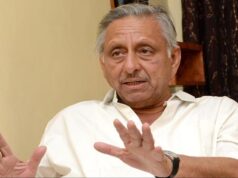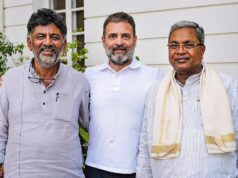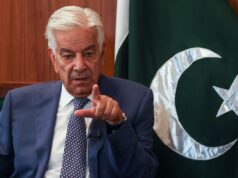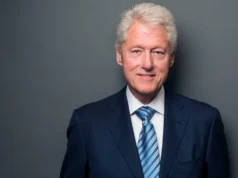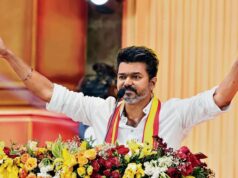Prime Minister Narendra Modi said on Monday that the BJP-NDA introduced a “new model of good governance” and that a family will now save almost Rs 20,000 on its annual household expenditure of Rs 1 lakh compared to the UPA period. He dismissed the opposition’s criticism of his government’s GST measures as lies of “bayan bahadur.”
Speaking at the opening of the Delhi BJP headquarters here, Modi urged party members to make sure that the advantages of the next generation of GST reforms are felt by everyone, particularly in states that are ruled by the opposition. He claimed that the decision and the increase in income tax exemption would save the public Rs 2.5 lakh crore annually.
He retaliated against the opposition for criticizing his administration by accusing the Congress government in Himachal Pradesh of engaging in “loot” by raising the cement levy shortly after the GST relief reduced the price of the material.
He claimed that these “bayan bahadur,” or people who enjoy using hyperbole, are masters at spreading lies on a daily basis.
According to Modi, under the Congress-led UPA government, taxes used to account for Rs 25,000 of the Rs 1,00,000 that a household spends annually on covering its basic necessities; today, this amount only amounts to Rs 5,000–6,000. He informed BJP activists that a family will now save around Rs 20,000.
The Modi government has been under fire from the opposition, which claims that it has been imposing excessive taxes on citizens for years since the introduction of the GST in 2017 before recently rationalizing the indirect tax system.
“BJP-NDA governments have given a new model of’sushasan’ in the country,” the prime minister declared.
With the motto “vikas bhi, virasat bhi,” we are proceeding. In order to instill trust for a resolute battle against corruption, we freed the nation from frauds and put the security of the people and the nation first,” the prime minister stated.
“During the UPA rule, the income tax exemption limit was only Rs 2,00,000; now, it is Rs 12,00,000,” he remarked, adding that “our governments focused on delivery and increasing the savings of common people.”
In an effort to lessen the nation’s reliance on imported commodities, Modi urged BJP employees to engage with traders and consumers to promote Swadeshi.
He reiterated a topic the prime minister has been particularly vociferous about since the US put a hefty tax of 50% on Indian goods: “The less our dependence on foreign products, the better it will be.”
“In order to make India self-sufficient, we must embrace Swadeshi,” he declared, advocating for its spread throughout the nation.
After opening the office, Modi urged party members to make sure that the new building is a location where people’s complaints are heard and answered, saying that the BJP is in government not for “satta” (power) but for “seva” (service), and its offices uphold this sentiment.
According to him, BJP offices are like shrines for party members and are a powerful way to engage with the public and meet their expectations.
He paid homage to the party’s many prominent figures in a speech that detailed the Delhi unit’s history dating back to the Jana Sangh, whose leaders founded the Bharatiya Janata Party in 1980 after their organization merged with the Janata Party in 1977.
Given that citizens from many states reside in the nation’s capital, Modi urged BJP employees to celebrate all of the festivals connected to various regions of India there.
In order to strengthen the spirit of “Ek Bharat Shreshtha Bharat,” he stated, “they should join people from different regions in celebrating their festivals, and it is very important for the country’s unity.”
He praised the city as “mini India” for its variety and added that people should realize that the BJP is a part of their family.
Modi claimed that when Indians see Diwali greetings at the Singapore airport or heads of various governments celebrating the festival of lights, they feel happy. He also added that when people in other parts of India see their festivals being celebrated in Delhi, they will experience a similar sense of joy.
According to him, the Delhi administration, led by Chief Minister Rekha Gupta, has been putting a lot of effort into promoting growth and growing the city’s pro-people offerings. To make it one of the greatest capitals in the world, he continued, the party members should cooperate.
Modi made a compelling case for the promotion of Swadeshi products, saying that BJP members should make sure that every store has a board that reads, “Garv se kaho ye swadeshi hai.”
Modi stated in his speech that trust and feelings are the foundation of the BJP’s connection with Delhi. He claimed that the party had served the city from the time of the Jana Sangh.
The Bharatiya Janata Party has been in power for forty-five years. Murli Manohar Joshi Ji, Rajmata Vijayaraje Scindia Ji, Nanaji Deshmukh, Atal Ji, and Advani Ji… This party has advanced thanks to the efforts and blessings of so many different people,” he stated.
However, the seed that grew into the massive banyan tree that is the BJP today was sown in October 1951.
Around that time, the Jana Sangh was founded, led by Dr. Syama Prasad Mookerjee Ji. And at that same period, the Delhi Jana Sangh also elected its first president, Vaidya Gurudutt Ji,” he added, adding that party members resisted the Emergency, assisted in the rehabilitation of partition victims, and shielded Sikhs from the 1984 riots.
